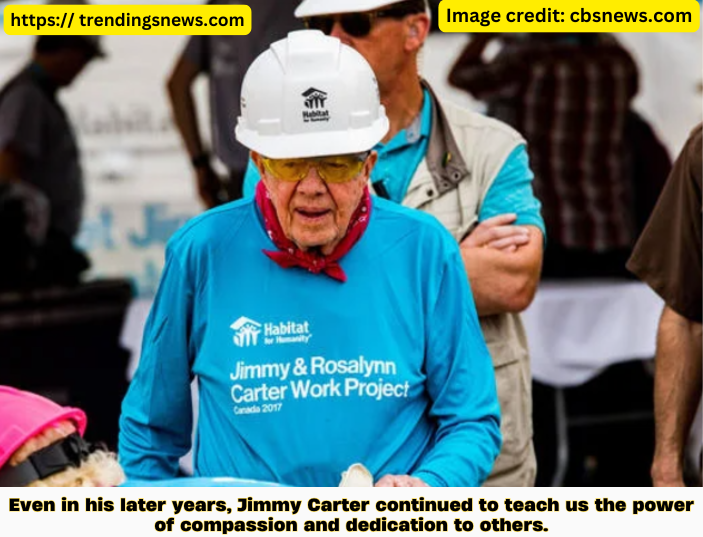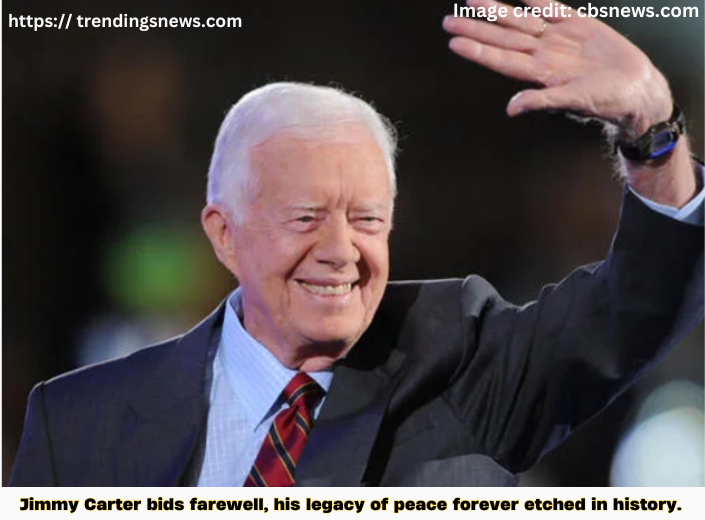Nobel peace prize winner Jimmy Carter died at 100. The 39th President of the United States and Nobel Peace Prize winner, passed away at the age of 100.
His legacy of peace, human rights, and tireless diplomatic efforts, including the historic Camp David Accords and formal diplomatic relations with China, leaves an indelible mark on history.
Introduction: A Legacy of Peace and Diplomacy
Nobel Peace Prize winner Jimmy Carter died on December 29, 2024, at the age of 100, marking the loss of a monumental figure in American history.
Carter’s influence stretched beyond his presidency, through his lifelong work promoting peace, democracy, and humanitarian causes worldwide.
Though he served only one term as the 39th President of the United States, Carter’s profound impact on the world stage, particularly in the areas of diplomacy and human rights, is undeniable.
As the oldest living president, Carter lived long enough to see the fruits of his lifelong dedication to peace and humanitarian work. His most significant achievements were in areas where global tensions had existed for decades.
From formal diplomatic relations with China to brokering the historic Camp David Accords between Israel and Egypt, Carter’s diplomatic legacy reshaped the future of international relations.
Carter was awarded the Nobel Peace Prize in 2002 for his tireless efforts to advance peace around the globe.
The Early Years: From Peanut Farmer to President
James Earl Carter Jr. was born on October 1, 1924, in Plains, Georgia, into a modest family. His father, a peanut farmer, instilled a strong work ethic in him, and his mother, a registered nurse, emphasized the importance of education.
Carter’s passion for reading and learning led him to the U.S. Naval Academy, where he graduated in 1946 with distinction.
That same year, he married Rosalynn Smith, and together they had a partnership that lasted more than seven decades—becoming the longest-married couple in U.S. presidential history.
After his service in the U.S. Navy, Carter returned to Georgia and ran his family’s peanut farm. However, it was his foray into politics that eventually led him to the highest office in the land.
As a Democrat, Carter became the Governor of Georgia in 1970, where he began to show his progressive stance on racial equality and his emphasis on fiscal responsibility.
His governorship marked the beginning of a political career that would culminate in the White House.
Presidency: A Time of Change and Challenge
Carter’s presidency from 1977 to 1981 was a turbulent period in American history.
Faced with significant challenges, including rising inflation, an energy crisis, and the Iran Hostage Crisis, Carter’s leadership was often criticized for being ineffective.
However, despite these domestic and international challenges, Carter made pivotal decisions that would ultimately define his legacy.
Formal Diplomatic Relations with China: A Bold Move
One of Carter’s most enduring legacies as president was his decision to establish formal diplomatic relations with China in 1979.
This decision was not only a diplomatic triumph but also marked the beginning of a new chapter in U.S.-China relations.
For decades, China had been isolated from the Western world, and Carter’s bold step to open up diplomatic channels between the two nations redefined global politics.
By recognizing the People’s Republic of China as the sole legitimate government of China and severing diplomatic ties with Taiwan, Carter made a historic move that paved the way for decades of economic and cultural exchanges between the U.S. and China.
This diplomatic shift was also a key element in Carter’s broader foreign policy agenda of detente and global cooperation.
The Camp David Accords: Securing Peace in the Middle East
Arguably Carter’s greatest achievement on the global stage was the Camp David Accords, which he brokered in 1978 between Israel and Egypt.
This historic peace agreement brought an end to decades of conflict between the two nations.
In the heart of the Middle East, where hostilities had previously been entrenched, Carter’s leadership resulted in the signing of a treaty that led to the normalization of relations between Egypt and Israel.
It was a landmark moment in Middle Eastern diplomacy.
The Camp David Accords provided a framework for peace in the region and resulted in Israel’s withdrawal from the Sinai Peninsula, a key territorial dispute.
Carter’s involvement in this process earned him international acclaim and highlighted his diplomatic acumen.
The peace treaty also showcased the importance of negotiation over military conflict—a principle Carter held dear throughout his presidency.
The U.S.-China-Russia War Alert: Carter’s Peace Advocacy in a Changing World
During Carter’s time in office, the geopolitical landscape was volatile, with rising tensions between the U.S., China, and Russia—a situation that remains relevant today.
As Carter pushed for peace in the Middle East, he also worked diligently to reduce tensions between the U.S. and the Soviet Union through arms control agreements such as the SALT II treaty.
The strategic arms limitation talks were aimed at curbing the nuclear arms race, which had been escalating throughout the Cold War.
As the world faces new U.S.-China-Russia war alerts in the present day, Carter’s diplomatic efforts are more relevant than ever.
His approach to engaging with China, particularly through diplomacy rather than conflict, set a precedent for future leaders.
Carter’s commitment to peaceful dialogue—both in his presidency and after—reminds us of the crucial need for cooperation and dialogue in global politics, especially in the face of growing tensions between the major global powers.
Life After the Presidency: A Lifetime of Humanitarian Efforts
Though Carter’s presidency was marked by struggles, his post-presidency years were marked by incredible humanitarian work.
After leaving the White House in 1981, Carter and his wife, Rosalynn, dedicated themselves to humanitarian causes.
The establishment of the Carter Center in Atlanta allowed Carter to continue his life’s work of promoting peace and global health.
Through the Carter Center, Carter advocated for peace, provided election monitoring in unstable countries, and worked to eradicate diseases like Guinea worm disease.
His efforts were not just political; they were deeply personal. Carter often traveled to countries in need, offering his services as a mediator and advocate for human rights.
The Nobel Peace Prize: A Lifetime Achievement
In 2002, Carter was awarded the Nobel Peace Prize for his efforts to promote peace, democracy, and human rights around the world.
While Carter’s presidency had its share of challenges, his post-presidency years proved that he had been an instrumental figure in advancing global peace.
The Nobel Committee recognized Carter for his tireless work to improve the lives of others, and for advocating for human rights and democracy.
At the time of receiving the Nobel Peace Prize, Carter stated that “we can reduce the suffering of others, and we can work together for peace.” His words reflect the deep belief he held in the power of diplomacy, empathy, and cooperation.

Health Struggles: Cancer Diagnosis and Continuing to Serve
In August 2015, Carter revealed that he had been diagnosed with cancer, specifically melanoma, which had spread to his liver and brain.
Despite the grave diagnosis, Carter remained resilient, and in true Carter fashion, he took the opportunity to continue his work.
He underwent a successful treatment regimen, which included immunotherapy, and shared with the world that, after treatment, there were no signs of cancer.
Carter continued his humanitarian efforts, teaching Sunday school and supporting the Carter Center’s initiatives until his final years.
A Final Farewell: Nobel Peace Prize winner Jimmy Carter Died at 100
The world lost an icon when Nobel Peace Prize winner Jimmy Carter died at 100. His death marks the end of a remarkable life defined by dedication to service and global peace. Throughout his life, Carter remained a beacon of hope for people worldwide. Whether through his presidency, his post-presidential work, or his advocacy for peace, Carter left an indelible mark on history.
As the world mourns his passing, public memorials will be held to celebrate his extraordinary legacy, including events in Atlanta and Washington, D.C. However, his impact will continue to shape global relations and humanitarian work for generations to come.

